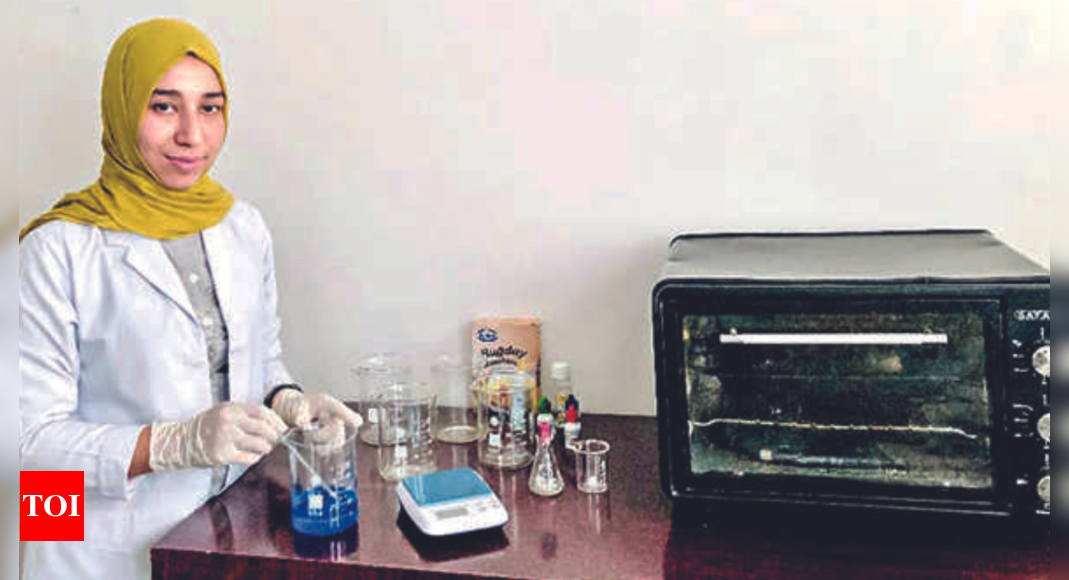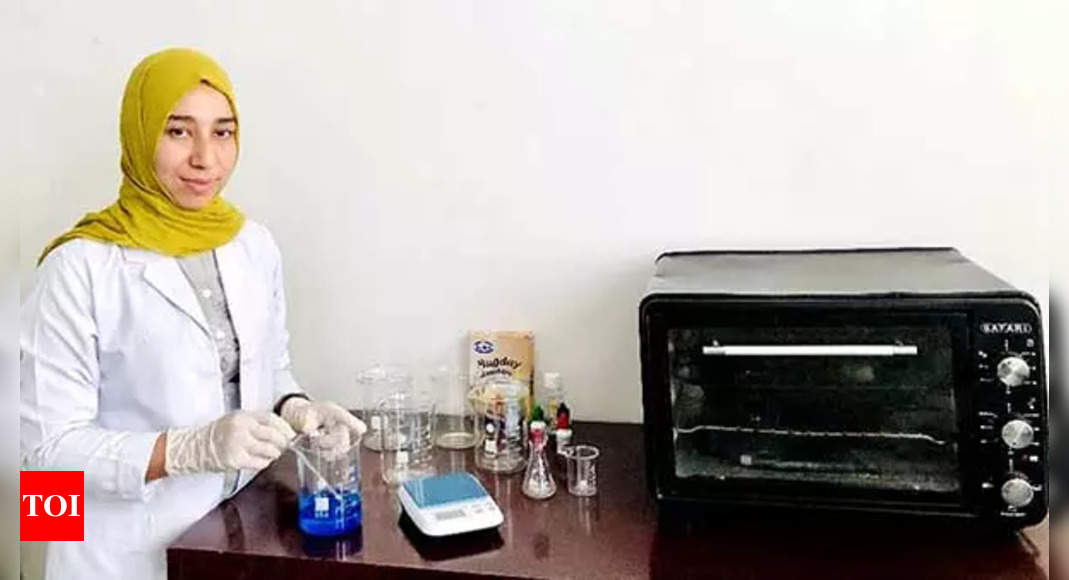INDIAPOSITIVE
ELITE MEMBER

- Joined
- Sep 20, 2014
- Messages
- 9,316
- Reaction score
- -28
- Country
- Location
Behishta Khairudddin speaks fluent English, a language she has taught herself online, which is a feat because she had all along studied in Dari.
NEW DELHI: Hidden from prying eyes and sniffing noses, Behishta Khairudddin ran her lab experiments on borrowed beakers and her sister’s microwave oven in her home and studied the high science of chemical engineering on a computer rigged to cave-age Wi-Fi for two years since the Taliban retook the reins of Afghanistan and banned women’s education.
The indomitable 26-year-old had enrolled in IIT-Madras for a master’s in chemical engineering during the tumultuous Taliban takeover in 2021. She was stuck in her province in northern Afghanistan. Isolated and confined to her home, she wrote and cleared all her semesters remotely, with IIT-Madras extending a long helping hand to the gifted Afghani woman whose name means paradise.
Behishta is among hundreds of students who cleared their post-graduation programme from one of India’s top institutes this year. In her joy of achieving what few can even think of in her country today, she chose to give the Taliban a piece of her mind.
“I don't feel any regret for myself. If you stop me, I will find another way. I feel sorry for you (Taliban) because you have the power, you have everything, but you are not using that. It’s you who should be sorry, not me,” she said in a phone-in interview with the TOI.
Behishta almost missed admission in the IIT after clearing the interview because of the diplomatic fallout when the Taliban took control of her country. “After that, I did not receive any response from ICCR (Indian Council for Cultural Relations, which provided scholarships to students from Afghanistan). My account in the portal has been deactivated. I reached out to the global engagement of IIT-Madras. Professor Raghu (Raghunathan Rengasamy) was there I think, and I emailed that I have passed the interview and had these issues. They gave me a scholarship and I started my studies a month later,” she said.
She worked hard as he had to, learning everything at home thousands of km away from her alma mater. “I struggled in two first semesters. Everything was new for me.” She stayed glued to the computer all her waking hours—resting just four-five hours at night. She said “I learned a lot of things compared to my knowledge” acquired in Afghanistan where she did her BTech from Jawzjan University.
Education has always been a priority in the Behishta’s household. “I was born in an educated and supportive family. My father is a social science graduate and my mother is a doctor. My older sister is an IIT PhD student, who too is stuck in Afghanistan. My second sister studied law, and my brother studied social science. I’m the fifth child.”
Behishta speaks fluent English, a language she has self-taught online, which itself is a huge feat because she had all along studied in Dari or Pashto language.
“I am what I am today because of the hard work I did in school (Khadija High School). Everything here is taught in our native tongue. I worked on my English after my fourth grade. After my eighth grade, I started teaching English in some language centres to improve my English,” she said.
The job was much-needed because her family was not well-off and she needed money to fund her education. “I got 10 out of 10 in my 10th, 11th and 12th class. After that I passed the Kankor exam, like the GATE exam of India. There I got a 300 out of 360 and got enrolled in Jawzjan University,” she said.
“But the knowledge I got in the two years with IIT-Madras is not comparable with the knowledge I got in my BTech programme. This is one of the big reasons I want to go to academics and not any industrial job. I can feel the needs of the education system in Afghanistan. Now that I have seen the high standards of IIT-Madras, I want to bring this standard to my country. If the new government lets us. Here we are facing a lot of difficulties,” Behishta said.
The Taliban have widely implemented their strict interpretation of Islamic law, or Sharia, banning female students from attending universities, girls from middle school and high school, women from most employment and ordering them to wear head-to-toe clothing in public.
Behishta said the situation is depressing and frustrating for women. “The girls I would tell them to please study. Study as much as you can. Study at home, read a book, study everything available. Don't go into depression. We will stand against this cruelty. We will change them,” she said.
Her name also means optimism and hope—but there’s a tinge of sadness. “You will always find me smiling. I can tell you a lot of Afghans are smiling. They are not actually happy. They are not smiling. It’s in their nature to smile at the struggles,” she said.
To the world outside Behishta said: “No, we are not Talibans, we are not terrorists. We are the common people. I don't want to go into politics; the common people want to see the country comparable with other improved countries. The only solution for my country is education. And I really thank all Indians, all those who are having parts for making me whoever I am right now. I will never forget this. I know one day this black time will pass.”

 timesofindia.indiatimes.com
timesofindia.indiatimes.com

 m.timesofindia.com
m.timesofindia.com
@Titanium100
NEW DELHI: Hidden from prying eyes and sniffing noses, Behishta Khairudddin ran her lab experiments on borrowed beakers and her sister’s microwave oven in her home and studied the high science of chemical engineering on a computer rigged to cave-age Wi-Fi for two years since the Taliban retook the reins of Afghanistan and banned women’s education.
The indomitable 26-year-old had enrolled in IIT-Madras for a master’s in chemical engineering during the tumultuous Taliban takeover in 2021. She was stuck in her province in northern Afghanistan. Isolated and confined to her home, she wrote and cleared all her semesters remotely, with IIT-Madras extending a long helping hand to the gifted Afghani woman whose name means paradise.
Behishta is among hundreds of students who cleared their post-graduation programme from one of India’s top institutes this year. In her joy of achieving what few can even think of in her country today, she chose to give the Taliban a piece of her mind.
“I don't feel any regret for myself. If you stop me, I will find another way. I feel sorry for you (Taliban) because you have the power, you have everything, but you are not using that. It’s you who should be sorry, not me,” she said in a phone-in interview with the TOI.
Behishta almost missed admission in the IIT after clearing the interview because of the diplomatic fallout when the Taliban took control of her country. “After that, I did not receive any response from ICCR (Indian Council for Cultural Relations, which provided scholarships to students from Afghanistan). My account in the portal has been deactivated. I reached out to the global engagement of IIT-Madras. Professor Raghu (Raghunathan Rengasamy) was there I think, and I emailed that I have passed the interview and had these issues. They gave me a scholarship and I started my studies a month later,” she said.
She worked hard as he had to, learning everything at home thousands of km away from her alma mater. “I struggled in two first semesters. Everything was new for me.” She stayed glued to the computer all her waking hours—resting just four-five hours at night. She said “I learned a lot of things compared to my knowledge” acquired in Afghanistan where she did her BTech from Jawzjan University.
Education has always been a priority in the Behishta’s household. “I was born in an educated and supportive family. My father is a social science graduate and my mother is a doctor. My older sister is an IIT PhD student, who too is stuck in Afghanistan. My second sister studied law, and my brother studied social science. I’m the fifth child.”
Behishta speaks fluent English, a language she has self-taught online, which itself is a huge feat because she had all along studied in Dari or Pashto language.
“I am what I am today because of the hard work I did in school (Khadija High School). Everything here is taught in our native tongue. I worked on my English after my fourth grade. After my eighth grade, I started teaching English in some language centres to improve my English,” she said.
The job was much-needed because her family was not well-off and she needed money to fund her education. “I got 10 out of 10 in my 10th, 11th and 12th class. After that I passed the Kankor exam, like the GATE exam of India. There I got a 300 out of 360 and got enrolled in Jawzjan University,” she said.
“But the knowledge I got in the two years with IIT-Madras is not comparable with the knowledge I got in my BTech programme. This is one of the big reasons I want to go to academics and not any industrial job. I can feel the needs of the education system in Afghanistan. Now that I have seen the high standards of IIT-Madras, I want to bring this standard to my country. If the new government lets us. Here we are facing a lot of difficulties,” Behishta said.
The Taliban have widely implemented their strict interpretation of Islamic law, or Sharia, banning female students from attending universities, girls from middle school and high school, women from most employment and ordering them to wear head-to-toe clothing in public.
Behishta said the situation is depressing and frustrating for women. “The girls I would tell them to please study. Study as much as you can. Study at home, read a book, study everything available. Don't go into depression. We will stand against this cruelty. We will change them,” she said.
Her name also means optimism and hope—but there’s a tinge of sadness. “You will always find me smiling. I can tell you a lot of Afghans are smiling. They are not actually happy. They are not smiling. It’s in their nature to smile at the struggles,” she said.
To the world outside Behishta said: “No, we are not Talibans, we are not terrorists. We are the common people. I don't want to go into politics; the common people want to see the country comparable with other improved countries. The only solution for my country is education. And I really thank all Indians, all those who are having parts for making me whoever I am right now. I will never forget this. I know one day this black time will pass.”

Afghan girl takes IIT-Madras M Tech degree from under Taliban's noses | Chennai News - The Times of India
Hidden from prying eyes, Behishta Khairudddin ran lab experiments on borrowed beakers and her sister's microwave oven in her home and studied chemical

The girl who defeated Taliban to get her IIT-M degree | India News - Times of India
India News: Doing your masters in chemical engineering is expected to be tough. But when you're forced to do it remotely, living in a remote province in northern
@Titanium100







